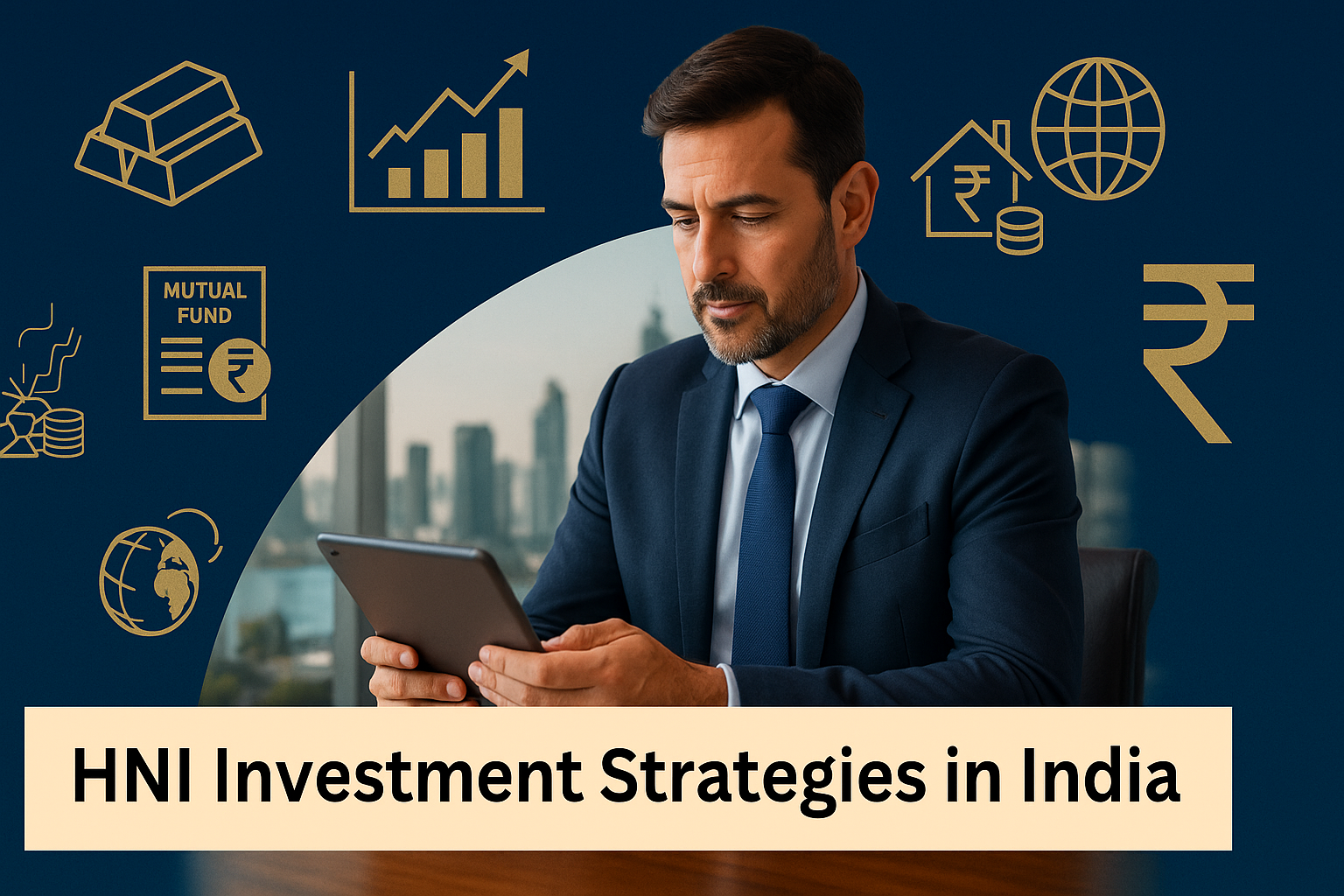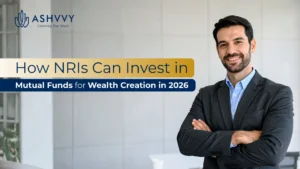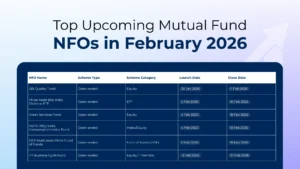Despite having your portfolio spread across real estate, fixed deposits, mutual funds, or stock market tips, do you still feel your investments aren’t really working for you?
You’re not alone. Many high-net-worth individuals in India invest across multiple assets, yet feel their wealth isn’t growing the way it should.
Sometimes, it’s due to scattered planning. Sometimes it’s because there’s no clear strategy behind the investment.
In fact, did you know?
As per a recent Economic Times survey, 43% of HNIs in India aren’t able to save even 20% of their income.
That’s exactly why it’s important to not just invest – but to invest smartly.
Here are some of the best investment options HNIs in India are using today to grow and protect their wealth.
Who Are HNIs (High Net Worth Individuals)?
An HNI (High Net Worth Individual) is a term that indicates a person with a minimum net worth of ₹5 crore (50 million Indian rupees) or more in investable liquid assets.
What are Investable Liquid Assets?
These are assets that can be easily converted to cash. They include:
- Cash and cash equivalents
- Stocks and bonds
- Debt mutual funds
They do not include your home, real estate properties, gold jewellery, luxury items, or personal-use belongings like cars, gadgets.
Who typically falls in this category?
HNIs are usually:
- Successful Entrepreneurs
- Corporate Executives
- Stock market investors
- Individuals with inherited wealth
These individuals often look for long-term, smart investment options beyond traditional fixed deposits or basic mutual funds. They also gain access to exclusive services like private banking, personalized advisory, and premium investment products.
Note: Globally, the HNI benchmark is at least $1 million USD in liquid, investable assets – excluding real estate or personal-use items.
Types of HNIs in India
The HNIs are categorised by their investment amount and the required complexity of financial services.
Category | Net worth (Liquid assets) | Who are they? | Focus |
High-Net-Worth-Individuals | Up to ₹ 5 crore | Usually includes top professionals or small business owners. | Focusing on strategic investment plans to grow their wealth steadily, reduce risks, and meet their future goals. |
Very-High-Net-Worth-Individuals | In between ₹ 5 crore and ₹25 crore | Includes entrepreneurs and long-term investors. | Focused on advanced investments like private equity, tax planning, and preparing for pre-IPO opportunities. |
Ultra-High-Net-Worth-Individuals | Above ₹25 crore | Includes big industrialists, wealthy families, or successful company founders. | Priorities include legacy planning, global investments, and managing wealth through customised advisory services. |
Equity Market
India’s equity market is growing fast and offers good opportunities for investors like you. BNP Paribas expects it to grow around 12-15% annually through 2025.
This growth comes from strong domestic demand and ongoing government reforms. Corporate profits are also likely to increase by 10-12% every year, according to Axis Mutual Fund.
While the market can be unpredictable sometimes, especially because of global events, India’s valuations still look attractive compared to other emerging markets.
That’s why many HNIs consider equities a smart way to build wealth over time.
Mutual Funds
Mutual funds are a popular choice if you want to invest but don’t want to manage every little detail.
As per AMFI, investments in Indian mutual funds crossed ₹38 lakh crore in 2025 and continue to grow steadily.
These funds let you invest in a mix of assets like equity, debt, and hybrids. You can choose what fits your risk, comfort and financial goals.
Because of strong regulations and regular disclosures, mutual funds are a safe and flexible option to grow your money.
Real Estate
Real estate remains a favourite for many HNIs because it offers steady returns and long-term value.
One challenge with real estate is that it is not very liquid. Buying or selling property can take time compared to other investments.
Because of this, many investors now prefer options like REITs (Real Estate Investment Trusts) and InvITs (Infrastructure Investment Trusts) in real estate.
Both REITs and InvITs give you exposure to real estate and infrastructure while avoiding the hassle of physical ownership.
REITs (Real Estate Investment Trusts)
If buying an entire property isn’t your style but you want regular income from real estate, REITs are worth considering.
India’s REIT market is growing steadily, with assets under management (AUM) reaching ₹1.63 lakh crore and distributions of around ₹6,070 crore in FY25. Currently, REITs make up just 14% of India’s real estate market capitalisation, indicating strong potential for growth driven by index inclusion and passive fund inflows.
They let you invest in commercial properties like malls and office buildings, often with smaller amounts.
As an investor, you get regular rental income without managing the property yourself.
InvITs (Infrastructure Investment Trusts)
InvITs are similar to REITs, but they focus on infrastructure assets such as highways, power grids, and telecom towers.
It gives you a chance to invest in big infrastructure projects and receive regular income from them. It is also easier to buy and sell than direct infrastructure projects.
Leading InvITs like IndiGrid have shown strong growth, with a 33% average annual increase in cash flow over recent years.
Government Bonds
Government bonds are a safe and steady investment if you want low risk and predictable returns.
India’s 10-year government bond yield is around 7.5% right now, which is better than fixed deposits that range from 3% to 7.25%.
The bond market in India has grown more transparent and liquid, so it’s easier for you to buy and sell bonds when needed.
Since these bonds are backed by the government, they come with very low default risk, making them a good way to balance your portfolio.
Global Investments
Investing globally is important if you want to reduce risk and tap into high-growth opportunities beyond India.
India’s economy is expected to grow about 6-7% annually in the next few years, according to Deloitte’s 2025 Economic Outlook.
But markets in the US, Europe, and other parts of Asia offer access to sectors like technology, healthcare, and renewable energy that might be missing at home.
Spreading your money internationally can help reduce portfolio ups and downs.
For example, the S&P 500 has given average returns of about 10% per year over the last decade.
With global ETFs and international mutual funds, it’s easier than ever to invest across borders and build a balanced portfolio.
Alternative Investment Funds (AIFs)
AIFs are getting popular with HNIs because they give you access to investments that aren’t easy to find elsewhere. They do come with higher risks, but the potential returns can be much bigger.
- Venture Capital (VC) Funds:
These let you put money into startups just getting started. Sure, many startups don’t make it, but if one does well, your returns can be huge. - Private Equity (PE) Funds:
PE funds invest in companies that aren’t on the stock market. These could be new businesses or established ones. It’s a long-term game and comes with more risk, but the rewards can be very high if the company grows. - Hedge Funds:
If you want to earn money no matter if the market goes up or down, hedge funds could work for you. They use different strategies to manage risk and aim for steady returns. They’re a bit complex and usually cost more, but they’re great for HNIs who want smart money management. - Real Estate AIFs:
These funds focus on real estate projects, like commercial or residential buildings. They let you invest in property without buying it yourself.
IPOs (Initial Public Offerings)
IPOs are a popular choice for HNIs because they allow you to invest in promising companies right when they enter the stock market.
For HNIs, IPOs offer the chance for quick profits on listing day as well as long-term growth. Sometimes, those who invested earlier through private equity use IPOs as an exit to realize gains.
SEBI reserves 15% of IPO shares for HNIs, giving you a better chance of getting allotted shares compared to regular retail investors. Usually, HNIs invest ₹2 lakh or more in a single IPO, increasing the chance of a larger allocation.
Of course, IPOs come with risks. Oversubscription or poor stock performance after listing can lead to losses, especially if you invested borrowed money. But when the stock does well, many HNIs take their returns within a week.
Art and Collectibles
Many HNIs invest in rare art, vintage watches, and luxury collectibles to diversify their portfolios.
The global collectibles market is growing fast, with a projected compound annual growth rate of about 11% through 2030, according to Grand View Research.
India is also seeing rising interest in these passion-driven investments.
While these assets can appreciate over time, they tend to be illiquid and need expert advice before investing.
Conclusion
HNIs play a vital role in India’s economy and financial markets. The choices you make not only help grow your own wealth but also support important sectors like infrastructure, real estate, startups, and global markets.
Today, you likely prefer investments that are diversified, tax-friendly, and thoughtfully planned, often with expert advice.
Looking ahead, more HNIs like you will explore opportunities beyond India and focus on investments that balance good returns with responsibility and a lasting legacy.
If you want to build a smart, well-rounded portfolio that fits your goals, consult with Ashvvy Investment today. We’re here to help you plan for a prosperous future.
Read More Blogs:
What is Portfolio Management?
Best Sharebrokers in Kanpur











